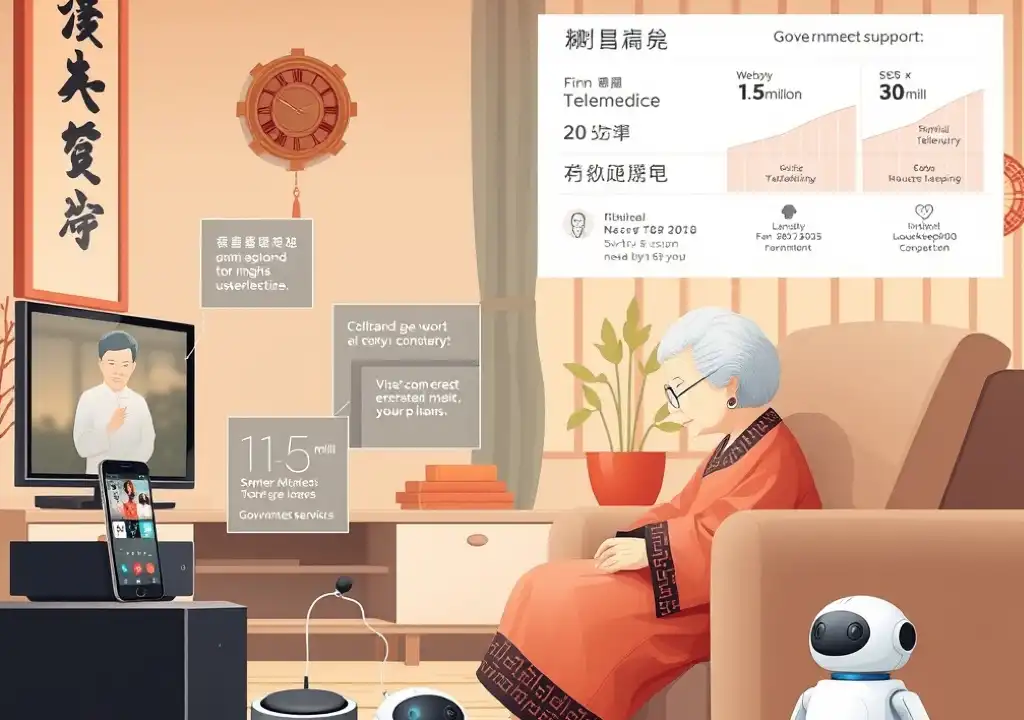Aging China and a Rising Demand for Care
With over 250 million people aged 60 and above, China is rapidly aging, and smart home technology is emerging as a vital solution. Lanchuang Network Technology Corp, a lesser-known firm, is at the forefront, charging elderly clients just one yuan (about 14 US cents) a day for access to a range of digital care services.
Affordable Digital Care
Lanchuang’s system, launched only four months ago, includes a set-top box, webcam, and “Xiaoyi,” a voice assistant similar to Siri. These connect users to telemedicine services, an SOS system, and additional paid offerings such as housekeeping and meal delivery. A small robot that responds to verbal help requests by contacting a medical centre costs an additional two yuan ($0.28) daily.
Rapid Expansion Plans
So far, the company has attracted 220,000 elderly users across 16 cities, with half located in Shandong province, where Lanchuang is based. The firm aims to reach 1.5 million users this year, 12 million next year, and 30 million by 2021, when it plans to go public on China’s tech-focused stock board.
Revenue from Service Providers, Not Users
CEO Li Libo, 47, stresses that the goal isn’t profit from elderly clients—many of whom survive on modest pensions—but to earn commissions from offline service providers. “The elderly care market in China is huge, but services are disjointed,” he said, comparing his company’s role to stringing scattered pearls together.
Smart Devices for the Silver Generation
Lanchuang is also collaborating with China Mobile to develop smartphones tailored for senior citizens. This initiative represents a broader trend among Chinese tech entrepreneurs to build integrated smart home care solutions for the elderly.
Struggles of the Elderly and Changing Family Dynamics
Liu, 66, from Jinan, recalls her struggle when her ailing mother faced health crises at night. With no round-the-clock medical access, she often felt helpless. Now living alone, Liu hesitates to burden her children, a sentiment common in modern China where fewer children must support multiple aging relatives due to the now-defunct one-child policy.
Home-Based Aging Preferred but Under-Resourced
Though retirement homes are increasing, they remain unaffordable and stigmatized. Three-quarters of China’s seniors prefer aging at home, but local governments have long neglected support for elder care, seeing it as a burdensome task.
New Government Backing for Tech-Based Care
However, the tide may be turning. In April, Beijing released a detailed policy to support elderly services, including technology-driven care. Lanchuang received nearly 22 million yuan ($3 million) from the central government and an additional 3 million yuan ($425,820) from Shandong province.
Overcoming Skepticism
Years ago, US entrepreneur Wang Jie, 59, faced resistance while introducing motion sensors for elderly care. Initially, he had to conduct trials in Canada before returning to China. Today, his firm, Beijing eCare Smart Tech Co, is active in two Beijing districts and negotiating with more, focusing on non-intrusive monitoring through sensors that track activity and alert family via an app.
Progress in Sensor-Based Monitoring
His company has sold several hundred sensor sets under three-year contracts with community groups and provides emergency training. Elderly clients pay nothing. “If an elderly person dies unnoticed for days, it reflects poorly on local authorities,” Wang explained, highlighting the value of proactive care systems.
Slow But Steady Adoption
Despite enthusiasm, usage remains modest. In Weifang, the Zhuojing Healthcare Centre, part of Lanchuang’s network, gets just one or two daily calls via the system. During a Reuters visit, two elderly users mainly used the tech for family video chats. Zhao Xi’e, 55, spoke to her nearby mother via the system but had no available service providers in her area and was unaware of her remote’s SOS button.
Early Days for a Promising Sector
Other aging nations like the US, UK, and South Korea are also exploring elderly tech—from voice-activated devices to robotic companions. But in China, smart home elderly care is still in its infancy. With policy support and entrepreneurial momentum, the groundwork is being laid for a more connected and dignified aging experience.

